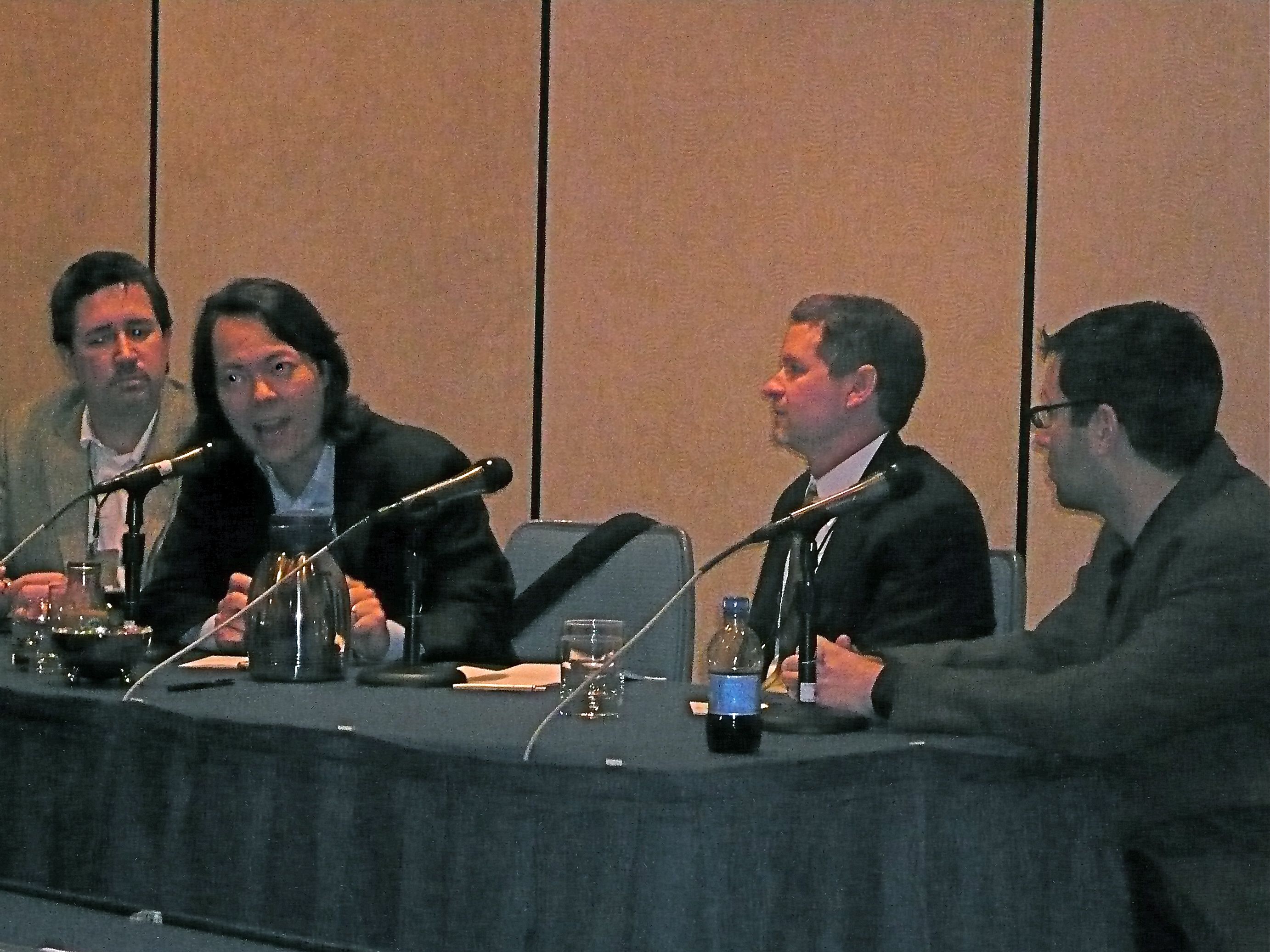Sparks fly over copyright at Tech Policy Summit

The group of copyright scholars and advocates gathered Wednesday at the Tech Policy Summit in Hollywood demonstrated that while copyright must function in a converged world, opinions on how it should function are as divergent as ever. The panel (pictured from left to right) consisted of Patrick Ross (Executive Director, Copyright Alliance), Fred von Lohmann (Senior Staff Attorney, EFF), Matt Zinn (VP and general counsel, TiVo), and moderator Doug Lichtman of UCLA Law School.
I. Copyright Policy
The primary bone of contention was the extent to which copyright law does and should leave room for permissionless innovation. Matt Zinn and Fred von Lohmann discussed the benefits of such a system:
Zinn: Fortunately, the Constitution got it right. Copyrights are not absolute rights. TiVo did not have to go to the rightsholders for permission [to build a product that allows flexible use of lawfully acquired copyrighted content]. If they'd had to, there'd be no DVR. With no DVR, there'd be no VOD.
Von Lohmann: In recent years, the law has begun to appreciate the value of organically derived genius, the wisdom of the crowds. The copyright system is doing a surprisingly good joyb of creating rights that leave room for the kind of diverse marketplace [Matt] was just talking about. iTunes, TiVo, iPods, Betamax: all devices that depend or depended on copyrighted works for a large portion of their value, and that's a good thing. Copyright law in its current form seems to trust markets quite a bit. This is not the death of copyright as we know it. In the room between the overreaching desire of rightsholders for control and what the law provides, innovation blooms.
Patrick Ross, while conceding von Lohmann's point that "there's no moral, ethical, or legal right to a business model," sought to reframe the issue, saying it's not about business models, it's about copyright:
Asking and getting permission is a key part of the system. . . . Where you get into a problematic situation is where the rights are being so abused and no legal authority is controlling it.
Picking up on Ross' defense of a permission-based system, Doug Lichtman challenged Matt Zinn on his assertion that TiVo could not have gotten permission had it asked first. He posited that TiVo would have been a value proposition for the television networks, and they would have been willing to partner with TiVo and give back a share of the enhanced value they would realize by meeting the audience demand for such a service. Zinn disagreed:
In Hollywood, it's not just about the money. It's about all the money.
Von Lohmann concurred:
Disruptive innovation does not get blessed in incumbent industries. When the music labels tried it with MusicNet, PressPlay, and all the other companies that are now smoking holes in the industry, it didn't work.
He went on to point out that one reason incumbent industries shun innovation is their reluctance to cannibalize their other businesses: here, sales of videocasettes, DVDs, etc.
At about this point in the discussion, Jay Williams of the MPAA stepped up from the audience to suggest Matt Zinn was being philosophically inconsistent about intellectual property, since TiVo recently won a patent battle with Echostar/Dish Network. "What are the value of those patents? Aren't they barriers to innovation?"
Zinn replied that TiVo goes out of its way to satisfy rightsholders that copyrighted material cannot readily be transferred out of someone's home or to someone else.
It's interminably slow to transfer material from one TiVo box to another in your home, because of all the encryption we're using at the insistence of the rightsholders.
More directly to the point, Fred von Lohmann rejoined that patents are indeed a barrier to innovation "in a market that is characterized by patent thickets. TiVo having one or two patents is not the same thing."
In response to Fred von Lohmann's and Matt Zinn's repeated points about the law's ability to kill innovation when drawn too narrowly, Doug Lichtman suggested that many rightsholder lawsuits are not designed to shut down a particular technology, but rather to get the parties to the table to make a deal. This just underscores von Lohmann's and Zinn's points about chilling infringement. Such tactical lawsuits are legalized extortion, and without "a copyright system that leaves room," such extortion works. von Lohmann made this point as follows:
If there's even a chance there's going to be infringement, there's a gun to your head — even if you don't know the unauthorized material is there. There is no corporate veil in copyright. They can and will sue you personally and come after your house. Statutory damages of $750,000 per infringement apply. It's relatively easy for the plaintiff to get an injunction that takes your product off the market while the lawsuit is pending. As long as we live in a world where the law has a gun to your head if there's any infringement, innovation is killed.
Though Doug Lichtman tried to get Fred von Lohmann and Matt Zinn to buy into the premise that there's a realistic way to filter or legally require filtering of unauthorized copyrighted material, both refused to bite. Per von Lohmann, the DMCA safe harbors recognize the impossibility of accurately guessing, in each instance, what's authorized and what's not:
But for the DMCA safe harbors, there would be no Google, or Yahoo!, or eBay, or Amazon. At least, not as we know them today. Tech companies need Washington. The safe harbors are there to make these companies happen. And where are the companies located? Here, in the U.S. We did a good job of relieving companies of the kind of technological risk involved in guessing.
II. P2P
Fred von Lohmann and Patrick Ross were also, unsurprisingly, miles apart on how to deal with file sharing. Von Lohmann described the EFF's collective licensing approach, pointing out that collective licensing is well established and works well in other contexts (e.g., radio). Ross rejected collective licensing, saying that artists "would be sidelined into oblivion." If you don't have collective licensing, you have lawsuits, and von Lohmann pointed out the RIAA admits its lawsuits aren't paying anybody. Which resulted in this exchange:
Ross: You're talking about civil actions.
Von Lohmann: If 30,000 Americans were in jail, that wouldn't be getting artists paid either.
All in all, it was a fascinating panel, with the participants lining up pretty much as you would expect (though it was difficult to tell precisely when Doug Lichtman was urging his own opinion or just stirring the pot as moderator). Though shifts are in the air — like Sony BMG floating the idea of a blanket license to its entire catalog — there remains a yawning divide in philosophy and approach between the entertainment and technology industries.
